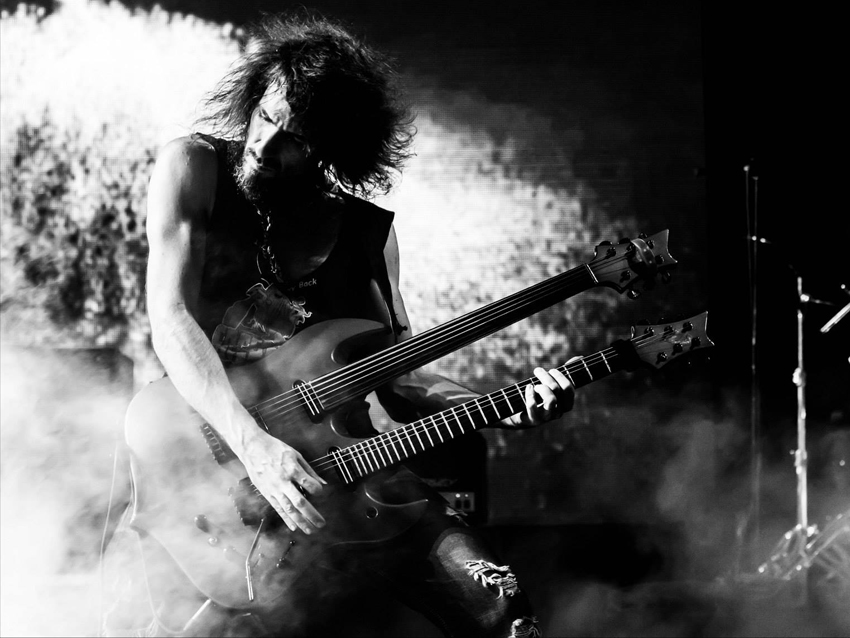
Ron "Bumblefoot" Thal's top 5 tips for guitarists
“Little Brother is all of us," says Guns N' Roses guitarist Ron "Bumblefoot" Thal, referring to the title track of his just-released 10th solo album, Little Brother Is Watching. "It's you and me and everybody. If you have eyes and ears, an internet connection and a voice, you’re part of Little Brother. We share information both good and bad, the spreading, exposing, the truth-telling and lie-concocting. We all yield a lot of power over one another.”
Aside from the drum tracks, which were performed by Dennis Leeflang, Little Brother Is Watching is a de facto solo project – Thal wrote, produced, mixed and mastered the album's 11 cuts, played all of the instruments, and sang lead and backup vocals. “I would’ve liked to have done the star-studded thing, but I was on such a roll that I didn’t want to stop," he explains. "Initially, I put out some feelers, but it turned into ‘Oh, you’ve gotta talk to the manager, the agent, this person and that.’ After a while, I just said, ‘I don’t have time for this. I’ve gotta keep moving.’"
The result is a record that is both fiercely rocking and strikingly intimate, and one that feels like a unified personal statement. "It's the full me," Thal asserts. "A lot of people know me from playing the guitar, but I do more than that. I’m a songwriter, a singer, a producer – I’m involved in the whole music-making process. I would never want to minimize being a guitar player, but so much of the time I’ve been used as a utility for shredding, and that's not what I'm all about."
With an emphasis on sturdy, memorable riffs and non-showy, hummable guitar solos, Little Brother Is Watching harkens to pre-shred guitar '70s rock – an intended homage, according to Thal. "All of my records pay tribute to that period in one way or another," he says. "That was the best time for rock music. It’s the foundation of everything I do – punk, classic rock and old-school metal. The songs were songs; they weren’t just backgrounds for incredible guitar technique. I love to play the guitar, no doubt about it, but more than that, I love playing good songs.”
Ron "Bumblefoot" Thal's Little Brother Is Watching can be purchased on iTunes and via Tin Man Merchandising. On the following pages, Thal runs down his top five tips for guitarists.

The drummer is your boss
“Dear guitar players: The drummer sets the pace and the groove. Do not jump in front of the drummer, no matter what. Don’t rush ahead, and if you do, you’d better not blame the drummer. And if you fall behind, it’s not the drummer’s fault, either. It’s you. You alone are to blame.
“Get with the drummer, lock in with him, and remember that he's your boss. Think about the old days: It was Gene Krupa and his orchestra or the Buddy Rich big band. They ran the show, and the band knew who they had to follow. In a group environment, things haven’t changed. You can be the greatest guitar player on the planet, but you have to follow that person behind you. Case closed.”

Sleep whenever you can
“That’s it – sleep whenever you can because it’ll probably be your last chance. You’ll do a show and you’ll get to the hotel, only to find that they screwed up the reservation. Only you’ll never be able to check in because the travel ran late and you have to go straight to the venue.
“Then you’re at the venue and you can’t go back to the hotel because there’s a gear issue, so soundcheck is pushed back. So you do the show, and then afterwards you have to do the meet-and-greet that nobody ever told you about. You like meet-and-greets and hanging out with the fans, so that’s cool, but it’s two hours. Then, at one in the morning, you go to the hotel to check in, only to discover another problem. That takes an hour to sort out.
“Finally, finally, finally you get into your room at two A.M. They’ve booked an early morning flight for you because they were able to save 10 dollars by making it a six A.M. flight instead of a nine A.M., flight, so you get maybe two hours of sleep because you have to leave the hotel before the sun rises to get to the airport.
“It’s always like this. Always. You get used to it, but that doesn't make it easy. So sleep whenever and wherever you can. If you’re a touring musician, you know this, but if you’re just starting out or if you’re about to embark on your first tour, take this to heart: You’ve got to fight for your right to sleep.”

Practice what your mind needs
“What do you need to do when you get on stage? Are you doing some sort of ‘guitar night’ jam? If so, then you have to get in the right frame of mind for improvising and letting your mind run free. So you have to get rid of overly critical thinking and allow yourself to have the ability to be in the moment.
“It’s important to practice what the mind needs and to remember that the fingers will follow. This is how people get into ruts: They overthink things and they become robotic. So stop beating up on yourself and let the music go where it needs to. Everything else will fall into place if you just get out of the way.”

Don't try to get out of your box
“This might sound counterintuitive, but it’s not. If you find yourself stuck playing the same pentatonic shape over and over, don’t try to fight it. Don't try to get out of your box – expand it. Add things to that box and let it become something new.
“If you’re comfortable playing in a certain way, that’s not the worst thing in the world, as long as you keep challenging yourself and letting new things happen. Pretty soon the box that feels constricting will become bigger and bigger, and you’ll find that you’re capable of so much more than you thought.
“That pentatonic shape? Add a note a fret before the first note of each string, almost as a grace note for a lead-in. Already you’re playing something new, and you might come up with a new kind of riff. Keep doing that until your box is so big that it takes you to a new box. Hmm, that sounds perverted.” [Laughs]

Learn how to sing
“When you sing, you’re expressing things in your first language. By doing things musically in that way, it’ll help you express things in your second language with your guitar. You’ll start to phrase things as if you’re singing, and you'll come up with very simple, singable melodies.
“It’ll help your songwriting because you’ll be expressing things with not one, but two voices – your singing and your guitar playing. It’ll also help you become more dexterous musically and will allow you to multi-task – you’ll think about more than just your guitar playing. If you can sing and play, you’ll tell a more vivid and sophisticated story than if you were just painting with one color.
“You’re also much more employable. You can add harmonies to other people’s songs as well as your own. Everybody can sing – I really believe that. If you think you can't, maybe you’re trying to sing in a way that isn't right for you, so you have to find your own voice. Think about it: You have Bob Dylan and Pavarotti – neither one could do what the other does. But that’s OK, because they found their own highly distinctive voices. Just be a great storyteller in your own way. It’ll help your guitar playing and your overall music making.”
Joe is a freelance journalist who has, over the past few decades, interviewed hundreds of guitarists for Guitar World, Guitar Player, MusicRadar and Classic Rock. He is also a former editor of Guitar World, contributing writer for Guitar Aficionado and VP of A&R for Island Records. He’s an enthusiastic guitarist, but he’s nowhere near the likes of the people he interviews. Surprisingly, his skills are more suited to the drums. If you need a drummer for your Beatles tribute band, look him up.
